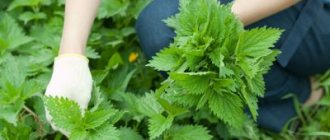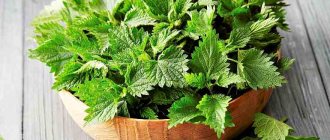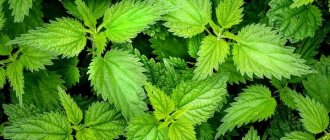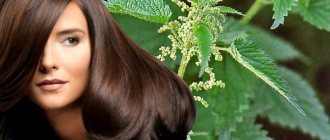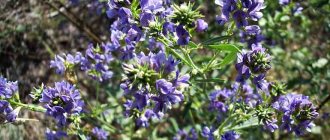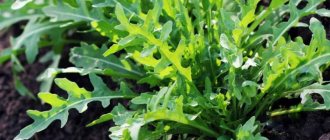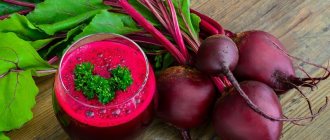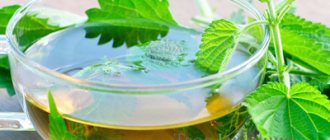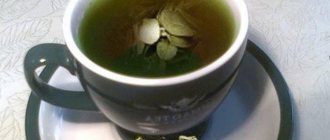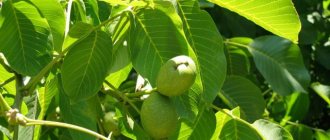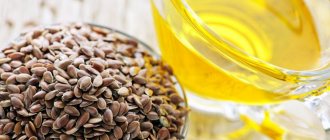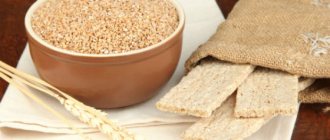Nettle tea is a healthy infused drink that is rich in vitamins and minerals. The drink is prepared from both fresh and dry leaves.
Nettle decoction is an incredibly healthy drink; it has long been used to treat various diseases. Stinging nettle and stinging nettle are mainly used for medicinal purposes - these are the most common types of plants.
Traditional medicine positions this tea as a vitamin and restorative complex, with the help of which metabolism is normalized. Nettle leaves are often used, but in some cases the root and stem of the plant are used. Nettle can be purchased at a pharmacy, or you can easily prepare it yourself.
Description
Nettle is a perennial (some annual) herbaceous plant with greenish and small flowers that are located at the corners of the leaves. The stems and leaves are covered with stinging hairs, which can cause a slight burn if touched. Stinging nettle is slightly different from stinging nettle. The first can reach a height of up to 150 cm, it has large leaves and yellow dry fruits in the form of nuts. Stinging nettle is shorter, the height of its stems reaches 60-80 cm, the leaves are small, but more stinging than those of stinging nettle (hence the name).
the plant grows everywhere where a temperate climate prevails; it cannot be found only in the Far North and in the tropics. Prefers moist, nitrogen-rich soil. When brewing tea with fresh leaves, the infusion turns out golden in color with a slight greenish tint. The aroma and taste are rich and herbal. Dry grass gives the drink a brown color, a hay aroma and a slight bitter taste.
How to dry nettles yourself
To dry your herbs at home, you will need a metal sieve, a vegetable dehydrator, and a towel.
- Wear gloves to avoid getting burned. Remove the leaves from the plant; we don’t need the stems and roots; wash the plant well;
- Place nettle leaves on a towel to drain;
- Place the leaves on a vegetable dehydrator and dry for several hours;
- Rub the prepared nettle between your palms until it becomes a powder.
Store the finished product in a dry glass jar. Having prepared a dry product, you can use it at any time. Dry nettle is added to pies, sauces, pancakes, omelettes, porridges, and soups.
Collecting leaves
Young nettles are collected from May to August (during this period the plant actively blooms), in dry weather in the afternoon. The plant is cut with a scythe or sickle at a height of one third above ground level. After collection, the plant is dried in a place protected from the sun for three hours. This process reduces the “hotness” of the herb, making it possible to separate the leaves from the stems with bare hands without causing irritation. The next step is drying. Nettle leaves are laid out on paper or wide-mesh fabric and left to dry in well-ventilated areas. To avoid steaming, the leaves are laid out in a thin layer and mixed periodically. During the process, rotten leaves are removed; they are brown or black in color. The finished raw material has a rich dark green color with a characteristic herbal and hay aroma. Next, the leaves are packaged in paper or cardboard packages.
Some industries use artificial drying of leaves. They are placed in special ovens or dryers and dried at temperatures up to 50 degrees. This significantly speeds up the process, but increases the risk of drying out the leaves. In this case, the tea may have a strong bitterness. Some manufacturers ferment the leaves after drying, which gives the drink a beautiful dark hue. When making filter bags, nettles, after drying, are finely crushed and packaged using automated technology.
Beneficial features
The benefits of nettle decoction for the body are undeniable - thanks to its rich composition, we can extract maximum benefits and get rid of some diseases. Let's study in detail in what cases the drink can have a beneficial effect:
- Has an anti-inflammatory effect in diseases of the liver, kidneys and gall bladder;
- Allows you to block blood circulation and is used as a prophylactic agent to prevent the occurrence of cancer;
- Removes cholesterol and lowers sugar levels, used for diabetes;
- Improves the activity of the urinary system, allows you to remove sand and small stones;
- Facilitates the course of prostatitis and kills pathogenic bacteria;
- Nettle decoction for bleeding of various types allows you to stop the harmful process;
- Used for severe allergies - histamines help stop a negative reaction to an irritant;
- Strengthens the immune system;
- Allows you to get rid of worms;
- Nettle decoction for the face helps remove symptoms of eczema and psoriasis;
- Enriches the blood with oxygen and nutrients, including hemoglobin;
- Eliminates pain in the lower back, neck and back;
- Dries out external inflammation, relieves suppuration;
- Helps get rid of acne and cellulite, severe wrinkles and vascular network;
- Normalizes sweating;
- Stimulates hair growth and fights hair loss;
- Used for the treatment and prevention of impotence, increases libido and stimulates the reproductive system;
- Normalizes sleep, relieves psycho-emotional fatigue, calms the nervous system;
- Cleanses the liver of waste and toxins.
We also recommend: Camembert and Brie cheeses: what is the difference?
Let us separately note how the drink affects young children and in what cases it can be used:
- Eliminates stomach pain;
- Relieves cough;
- Strengthens the immune system;
- Relieves inflammatory processes in the oral cavity;
- Used for anemia to normalize iron levels;
- Helps cope with allergic reactions.
In order not to encounter contraindications for nettle decoction, you should first coordinate the use of the drug with your pediatrician.
Pregnancy and lactation are an important stage in a woman’s life; during this period, any medications, even natural ones, should be taken with caution. We will tell you in what cases nettle helps - but do not forget about consulting a gynecologist:
- Improves mood, helps relieve headaches;
- Nettle decoction after childbirth and during pregnancy relieves depression and gives strength;
- Strengthens the cardiovascular system; Relieves swelling and has a positive effect on kidney function. Also, read how to take oat decoction during pregnancy in our other article.
We figured out why you should drink nettle decoction, we hope that you don’t have any questions? Now it’s worth discussing possible harm - do not ignore this information!
We also recommend: Fish oil and vitamin D
Nettle tea benefits and harms
Nettle leaves have a unique beneficial composition, which contains substances necessary for the proper functioning of the body. There are many such substances in the plant. Usually the most important useful components are identified:
- chlorophyll – is a powerful antioxidant, kills bacteria, improves immunity, normalizes the gastrointestinal tract, prevents the growth of cancer cells;
- phytoncides are natural antibiotics that contribute to the death of bacteria, viruses, microbes and fungi;
- organic acids – stimulate the secretory function of the stomach and improve the functioning of the entire gastrointestinal tract;
- tannins – have an astringent and antioxidant effect, eliminate inflammation and help strengthen capillaries;
- ascorbic acid – strengthens the immune system, cleanses blood vessels, removes heavy metals from the body, reduces cholesterol, enhances metabolism, restores connective and bone tissue;
- carotene – improves vision, helps in the treatment of gastric and genitourinary diseases, normalizes cholesterol, participates in skin regeneration;
- vitamins of group B, as well as E, K, PP - normalize the functioning of the nervous system, improve vision and blood clotting, strengthen the heart muscle, prevent the occurrence of heart and vascular diseases, as well as blood clots;
- micro and macroelements - calcium, magnesium, iodine, iron, phosphorus, copper, boron - strengthen the skeletal system and tooth enamel, restore the functioning of the thyroid gland, and strengthen the nervous system.
Medicinal properties
Tea made from nettle leaves has a number of medicinal properties. This has been confirmed by scientific research, so many doctors recommend drinking this healing drink when treating certain diseases. It has the following actions:
- Stops bleeding (including uterine).
- Removes harmful substances from the body, as well as excess fluid, promotes weight loss.
- Prevents the development of heart disease, cleanses and strengthens blood vessels.
- Helps remove kidney stones.
- Eliminates inflammation, kills germs and bacteria.
- Effectively improves digestion and functioning of the gastrointestinal tract.
- Prevents bone fragility and damage to tooth enamel.
- Normalizes the menstrual cycle in women.
Contraindications
Since nettle is a medicinal plant, in some cases it is better to avoid using it or take it with caution. Nettle tea is contraindicated for people who suffer from heart failure and edema, are allergic to this plant, have blood clots and high blood pressure (due to the plant’s ability to increase blood clotting), as well as varicose veins. The drink is contraindicated during pregnancy, due to the risk of increased uterine tone, and in case of renal failure, since tea has a diuretic effect. Do not use if cysts or polyps are bleeding. You should drink the drink with caution in extreme heat, as this can cause negative consequences such as nausea and dizziness.
Nettle decoction for pregnant women - can I drink it?
Recommendations regarding nettle tea for pregnant women are often given by observing doctors, believing that the drink will help improve the health of mother and baby in the womb. Indeed, the tincture or decoction has a beneficial effect on the body during pregnancy, helping to improve the functioning of the pancreas, preventing an increase or decrease in blood sugar levels, which is a common problem during pregnancy.
Proper consumption of the drink during gestation also contributes to the active removal of toxins and normalization of the functioning of the kidneys and liver. Naturally, there are contraindications for pregnant women in the first trimester. Until the end of the “dangerous period” it is better to refrain from any experiments, allowing the body to independently cope with an important stage - the birth of a new life.
Considering the blood-forming property of nettle, there is a risk of increased uterine tone and bleeding in the first months of pregnancy. You should also be careful with tea in the last weeks before giving birth, be sure to consult a doctor about its use.
How to cook (brew)
The method of brewing the drink depends on the form in which the nettle is used: fresh, dry or in the form of tea bags. In any case, it is best to use ceramic or glass utensils to prepare this tea.
To make a nettle decoction from fresh raw materials, you need to take 10 pieces of leaves, add 300 ml of water at room temperature and put on low heat. As soon as the water begins to boil, you must immediately remove it from the heat. Cover the dish with a lid and wrap it in a towel. The tea should steep for 30 minutes. After time, strain.
To prepare tea from dried nettle leaves, you need to pour one teaspoon of nettle into a glass and fill the glass to the top with hot boiled water, brew for 15 minutes. It should be strained before use.
If you use pharmaceutical filter bags, then you need to put 2-3 bags in a bowl and pour a glass of boiling water. Cover tightly with a lid and let sit for 20 minutes. Then you need to squeeze out the bags and add a glass of hot boiled water to the infusion and mix.
Good tonic for women
Nettle tea is rich in iron and helps fight anemia. Pregnant women are advised to drink nettle tea to prevent bleeding and keep the fetus strong. Nettle also functions as a herbal that stimulates milk production in nursing mothers. Young women can also drink nettle tea to help prevent the bloating and cramps that accompany the onset of their menstrual cycle. It also reduces fibroids, regulates the menstrual cycle and prevents menopausal symptoms in women by producing estrogen.
Global warming is causing baby sharks to be born malnourished
Record temperature increases and permafrost: the state of the climate in 2021
When leaving the office, the man forgot to close the door: in the morning he thought he had been robbed
How to drink nettle infusion
Drink warm nettle tea, one-third of a glass, 20 minutes before meals, up to three times a day. The course of treatment largely depends on the disease and is determined by the doctor. Often it is about 10 days. If a longer period of administration is expected, then the infusion is taken one tablespoon 30 minutes before meals 3-4 times a day.
Long-term storage of the finished infusion reduces the beneficial effect, so it is better to prepare the drink immediately before use. Tea is medicinal, so excessive consumption and the addition of sugar or honey to improve the taste are not allowed. This decoction can be used for cosmetic purposes, for example, for rinsing hair, this will prevent hair loss and restore lost strength and shine.
How to prepare nettle tea
Home-brewed nettle tea can bring both benefits and harm. You need to prepare it correctly. Tea can be brewed from either fresh or dried nettle leaves. First you need to put them in a small saucepan, carefully pour in room water, cover with a lid and gradually bring to a boil over low heat. After the water boils, you should immediately turn off the heat, and then steep the tea for half an hour. You need to drink nettle tea decoction 3 times a day, approximately a quarter of an hour before meals.
Nowadays, nettle can be used in a wide variety of herbal preparations. You can purchase such tea mixtures at a pharmacy. Particularly tasty and healthy nettle tea is found in teas made from a mixture of this plant with rose hips. It is easy to prepare this tea at home. You need to take one handful of dried/fresh rosehip, two tablespoons of nettle leaves, pour it all with 2 liters of boiling water, and then leave it in a thermos for at least three hours.
